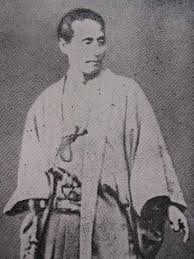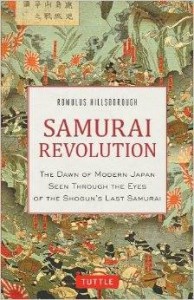“I had never felt so sorry about anything in my life.” (こんな残念な事は生まれてからまだなかったよ。) Katsu Kaishu
[Most of my posts focus on the historically significant aspects of my subjects – i.e., their place in the “samurai revolution at the dawn of modern Japan.” Here is a glimpse at the humanity of Katsu Kaishu, the “shogun’s last samurai” in my Samurai Revolution.]

Katsu Kaishu was a great lover of books. But in his poverty as a young man, “I didn’t have the money to buy books” he told an interviewer from the Kokumin Shimbun newspaper on March 19, 1898. “Between Nihonbashi and Edobashi [districts in downtown Edo], . . . was a small bookstore. . . . I used to go there often and stand in front of the store reading the books. [The proprietor], realizing that I was too poor to buy books, was always very kind to me.
“There was a merchant from Hokkaido, named Shibuta Riuemon, who also used to frequent that store. He had heard about me from [the proprietor], and, in fact, was a very admirable man. He also loved books and said that he wanted to meet me. Finally we met at the bookstore. Well, Shibuta said that since we had the same interest he hoped that we could be friends. He said that he would visit me at my home and invited me to the inn where he was staying. He wouldn’t take ‘no’ for an answer. The inn was located near the old Eitaibashi [bridge]. We ended up spending the entire day there, just talking about things.
“He was from a merchant family in Hakodate. He had been very fond of books since he was a boy and spent all his time reading, much to the displeasure of his parents. So they forbade him to read, but he would nevertheless read on the sly. One time they found him reading and gave him a terrible scolding. As punishment they tied his hands together and shut him in a room in the upstairs of their house, so that he had nothing to eat the entire day. When evening came, his parents, thinking he had learned his lesson, went upstairs to see him. Far from learning his lesson, when they found him he was reading a picture book that lay on the floor, which he had opened with his feet. Well, his parents finally gave in and told him that he would be allowed to read as long as he did not neglect the family business. Shibuta was very happy. Whenever he had time off from the family business, he would go out and buy books to read. . . . He had some very interesting things to say. He was a refined person, and thin with a light complexion like a woman. But there was something about him that was resolute—he stood firm and was a man of character.
“Two or three days after [our first meeting], Shibuta came to my house. I was extremely poor back then. For floor covering all we had were three worn out tatami [mats]. We had used up all of the ceiling boards for firewood. But Shibuta wasn’t bothered by any of that. . . . [The two men spent the afternoon talking.] Then, as he was leaving, he took 200 ryo [nearly five times the annual stipend of the Katsu household] from his pocket. ‘This isn’t much,’ he said. ‘But use it to buy books.’
“At first I was at a loss for words and just stared at him. Shibuta told me not to worry about it. ‘If I didn’t give you this money, I’d spend it soon enough,’ he said. ‘I’d rather that you used it to buy some rare books. Then after you’ve read them, you can send them along to me.’ Then he left. He also gave me . . . [some] writing paper. ‘If you find any interesting books in Dutch, translate them on this paper,’ he said. . . . He thought that I was too poor even to buy paper. . . . [It was on this same paper that Katsu Kaishu would write his famed Keio 4 Boshin Journal. (Matsuura Rei. Katsu Kaishu. Tokyo: Chikuma Shobo, 2010, p. 323) Regarding Keio 4 Boshin Journal, see Samurai Revolution, beginning of Chapter 26.]
“After that we continued to correspond. Shibuta was very happy for me when he learned that I would be going to Nagasaki to study [at the Bakufu’s naval academy in 1855] … I really appreciated his support and had intended to repay him someday. But regrettably Shibuta died [of tuberculosis in 1858 at age forty-one] while I was in Nagasaki. I had never felt so sorry about anything in my life.” (Hikawa Seiwa (Katsu Kaishu Zenshu 21) Tokyo: Kodansha, 1973, pp. 8-10.)
For updates about new content, connect with me on Facebook.
Samurai Revolution, a comprehensive history of the fall of the Tokugawa Shogunate and the rise of Imperial Japan, is also the only biography of Katsu Kaishu in English.

